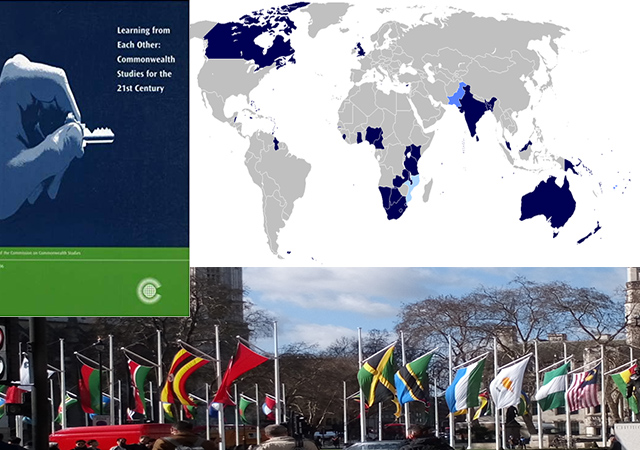 (top/ clockwise) Learning from Each Other: Commonwealth Studies for the 21st Century (1996 edition)/ Commonwealth map/ Commonwealth flags in London 2019.
(top/ clockwise) Learning from Each Other: Commonwealth Studies for the 21st Century (1996 edition)/ Commonwealth map/ Commonwealth flags in London 2019.
One reason why the Commonwealth is marginal to the concern of its 54 governments is that few know what it does that has impact. What does it do that succeeds, what doesn’t?
This could begin to change, over the next few years, if its work and strategies are exposed to more rigorous analysis, with published results. An opportunity now arises with the launch of annual Commonwealth Studies Studentships for PhD researchers by the Round Table journal, supported by our publisher, Routledge/Taylor & Francis, and the Association of Commonwealth Universities.
It is now 23 years since the Commission on Commonwealth Studies, chaired by Professor Tom Symons of Trent University, Canada, published ‘Learning from Each Other: Commonwealth Studies for the 21st century’. The inquiry was launched at the request of Chief Emeka Anyaoku, then Secretary-General, but so far the 21st century has proved deaf to its proposals. An Association of Commonwealth Studies, founded afterwards, petered out.
But the opportunities for graduate researchers to inquire into the reality of the Commonwealth are manifold, and exciting. There is encouragement here to interrogate what happens when governments or civil societies try to collaborate voluntarily, under the umbrella of a non-treaty organisation. Do volunteers achieve more than ‘pressed men’ or those required to work together by treaty? How much can ‘coalitions of the willing’ achieve, when others remain obstinately unwilling? Ever since I headed the Commonwealth Policy Studies Unit (CPSU) at the London University’s Institute of Commonwealth Studies from 1999–2005 I have wanted to know more about the effectiveness of Commonwealth cooperation.
The Commonwealth Secretariat, and Commonwealth unofficial organisations, have developed a battery of interventions designed to help governments and partners whom they do not have the right to compel: benchmarks, action plans, toolkits, best practice exchanges and workshops. Some of these go out over the internet, like bottled messages thrown overboard by nineteenth century sailors, with totally unknown results. Did anyone act on the action plan? Was the toolkit any use, either in preventing some policy breakdown, or in fixing it when officials were tearing their hair out?
What we do know divides between the optimistic and the pessimistic. The last Secretary-General Kamalesh Sharma used to quote the Mo Ibrahim Index of African Governance for the mysterious benefits of Commonwealth membership. It is true that the 2018 index shows seven out of the top ten African countries as members – Mauritius, Seychelles, Namibia, Botswana, Ghana, South Africa and Rwanda. Equally important, there are no Commonwealth states among the bottom 20, though Zimbabwe is a former member.
My own experience long ago, of the impact of a specific set of workshops, was less encouraging. Although undertaken for the Commonwealth Fund for Technical Cooperation with Indian and Ghanaian colleagues in 1993 it was a thorough study of a programme of 12 workshops, in human rights training for 164 public officials, in countries in the Pacific, Africa and the Caribbean. At the time the direct costs of £120,000 were substantial for the small Human Rights Unit at the Secretariat. But the results were disappointing. While participants were expected to return home and pass on their training, only one person, a Ugandan police superintendent, sought to do so. My fear is that the workshop model, used by many bodies from the Secretariat to the Commonwealth Journalists Association, has been of erratic value.
But my wish list for serious research is lengthy. What is the impact of Commonwealth election monitoring, and its reports, and which are the elections that are never looked at? It is some 15 years ago that Amanda Sives investigated monitoring for the CPSU. What has changed? Then there is the Commonwealth Ministerial Action Group, the pioneering mechanism – a rules committee for a voluntary grouping – that set standards in the 1990s. What actions has it taken, as its remit has altered over the years, and with what success? Where has it failed to move, when there have been breaches of the principles governing its remit?
Have drastic cuts in Secretariat staffing reduced its political or development value? Many ministerial meetings have been cut. Commonwealth Health Ministers used to gather for three days in a Commonwealth capital, but now spend half a day together at the start of the World Health Assembly in Geneva. Is our health better or worse for the change?
Round Tablers could suggest many themes to prospective PhD students who want to investigate what today’s Commonwealth adds up to. A talkfest, or an international player that can change minds and do things that others can’t? Is it now just a peripheral actor, only significant for small states? Or is it neglected because larger members fail to invest in the difficult diplomacy that could make a difference for its own peoples and the wider world? There is no shortage of good questions.
Richard Bourne is a former Chair and a member of the Editorial Board, The Round Table. Opinions expressed in Journal articles do not reflect the editorial position of the Round Table Editorial Board.
Find out about the latest Routledge/Round Table Commonwealth Studentship Awards
The report: Learning From Each Other: Commonwealth Studies For the 21st Century



